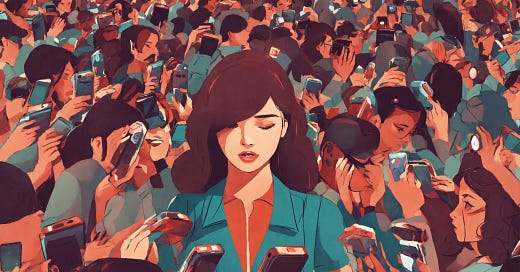For the longest time, I have struggled with phone usage. I dreaded that notification on Sunday that reminded me that I spent at least three to four hours per day on my phone. "That's three “working” days on my phone. I could have done so much during that time", I told myself.
The usual culprits were Youtube, Reddit and ChatGPT. Instagram and Twitter were long gone as it was clear they were not adding any value to my life. While for the others, I couldn't get myself to delete them. "I need them to look things up", I told myself.
My mood was at the whim of Reddit. I noticed that every time I opened it, I felt worse off later. It could be a rant in r/sanfrancisco or a success story in r/indiehackers.
My curiosity found its best companion, ChatGPT. Any question that pops in my head can now be answered fast, in a format I specifically designed for my own comprehension (a topic I want to write about in the future).
Then, one day, I dropped my phone, and the charging port broke. Charging my phone became unreliable and tedious. Naturally, my phone usage declined until the phone stopped working entirely. I delayed fixing it or buying a new one for a few days for the sake of experimentation. Few days turned into a week. A week turned into a month.
I made the following observations during the time I spent *phone-less*:
- The world around us is full of clues. Whether you're going somewhere or looking for something, if you're patient enough, you will get there. Most people are willing to help (unless you ask them for a ride). Navigating these clues can also be quite fun.
- I would constantly look things up when I'm outside (hint: Explain AI). For example, I could be walking in the Mission district in SF and notice that it was a little warmer than my neighborhood less than a mile away. I will hurriedly look up “How does SF geography affects the climate of SF's different neighborhoods?”. As it turns out, I didn't need to know any of these things.
- Friends adapt. I was originally worried that my friends would be mad at me for not being reachable in real-time. It was fine.
The most important observation however was that I didn't need my phone. I didn't need to listen to music when I'm in the gym. I didn't need to tend to anyone when I'm going out for a walk. I didn't need to listen to podcasts on the bus. The world was quite entertaining.
Taking a small notepad with me when outside made a huge difference. On the one hand, it was practical to write directions, grocery lists, .. etc. On the other hand, I used it to jot down a lot of creative thoughts I had.
Phones today are insatiable entertainment devices. Every single app is competing for screen time. Our brains on phones are analogous to our guts on sugar, except it's much worse. Our guts tell us when they're full. And we've probably internalized how bad sugar can be for our health.
How did my *phone-less* journey end? My car battery died in a gas station in Mountain View and no one was willing to help. This reminded me the importance of a phone (not necessarily a smartphone).
It's been 4.5 months now with a boring phone and I am happy to share that a lot of the habits haven't yet resurfaced. The phone spends most of its time dead or lost. Nevertheless, I can feel a few habits creeping back up, like a subtle urge to check my emails or turn on music when I enter the gym. But, as long as I’m aware, I’m not too concerned.
Some of the readers might wonder "what did you achieve with all this extra time?". As it turns out, I learned that my phone usage was not taking away from my productive time directly. Instead, it consumed my mental bandwidth and my mood during my recovery time, which subsequently affected my productive time. Today, I feel more present and less inclined to compulsively consume. I call that a win.




Thanks for being my real-life Screen Time Usage report!
this is an awesome experiment; reminds me of a time when i went off the grid (all electricity) every Friday eve – Sunday 4pm. For a short while, life was put on a break and nothing was requiring my attention.